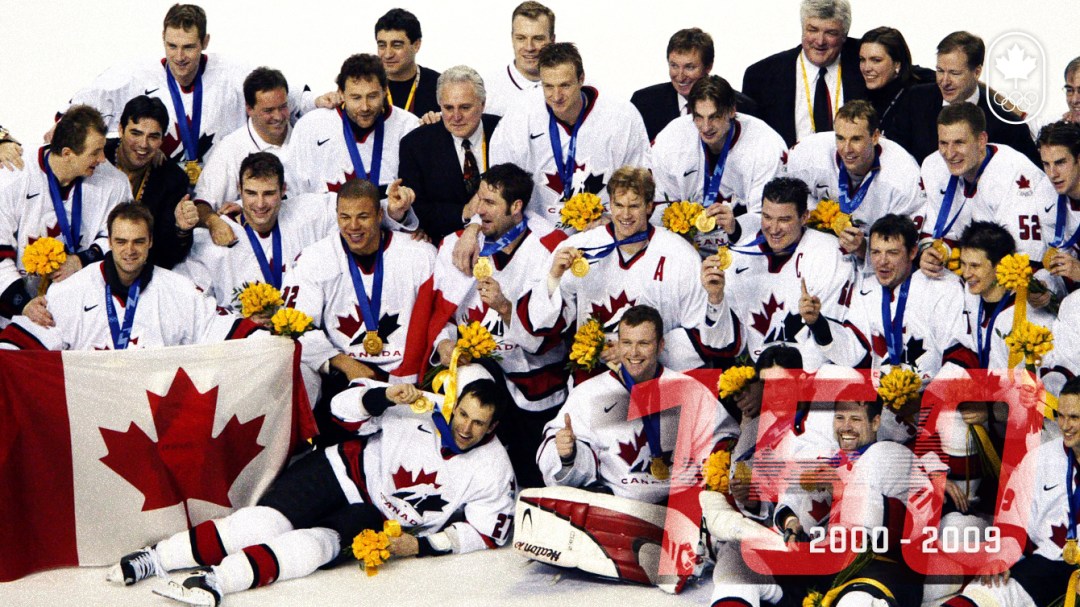150 years of Canadian sport: the 2000s
It’s time for the penultimate decade in Olympic.ca’s countdown to Canada’s 150th birthday celebration on July 1.
We may not have a time machine, but you can travel back to the most memorable moments from Canada’s sporting past here.
But now, the first decade of the 21st century, which was filled with so many historic Canadian accomplishments it was no easy task selecting who to feature.
2000 – Whitfield Sprints to Victory in Inaugural Olympic Triathlon
With only a handful of international podiums on his résumé, Simon Whitfield was far from a gold medal favourite for the first ever men’s Olympic triathlon. At Sydney 2000, he came out of the water after the 1.5km swim in 28th place and then was almost taken out of the race completely when several riders crashed on their bikes. He scrambled to finish the 40km leg, starting the 10km run in 24th place, a full minute behind the leader.
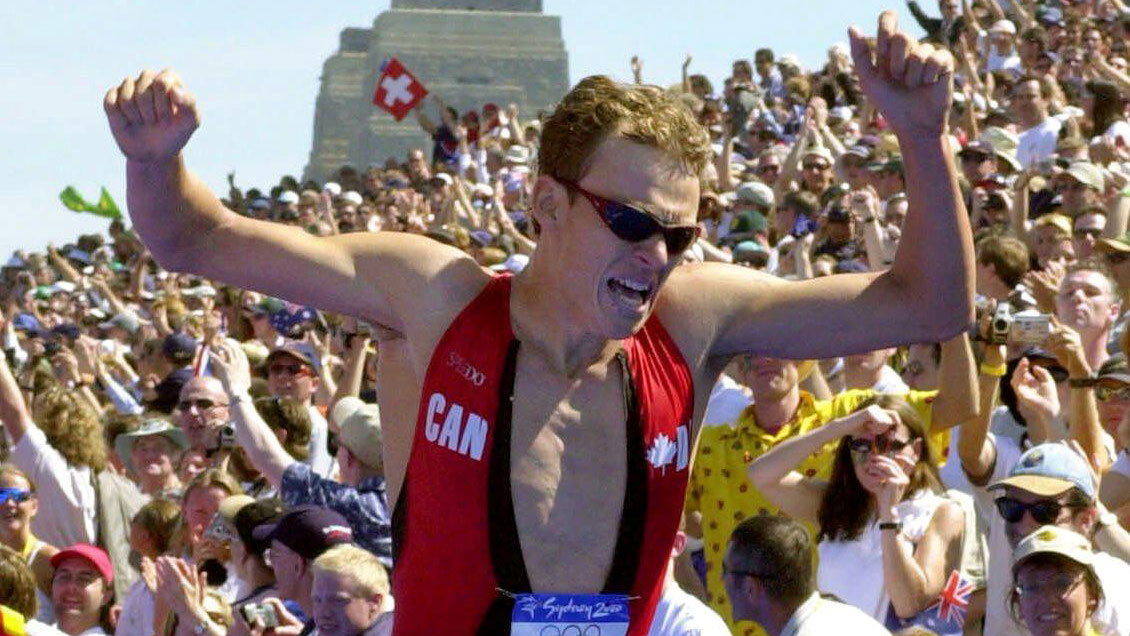
Simon Whitfield as he crosses the finish line at the Sydney 2000 triathlon in gold medal position on September 17, 2000.
But that run was where he knew he could make up time and positioning. One by one, he overtook those ahead of him until with less than a kilometre to go, he had the leader, Stephan Vuckovic, in his sights. Whitfield made his charge, passing the German as the Sydney Opera House came into view and then pulling away to win by more than 13 seconds. Eight years later, another super sprinting effort by Whitfield earned him the silver medal at Beijing 2008.
2000 – Canada Wins Tennis Doubles Gold in Huge Upset
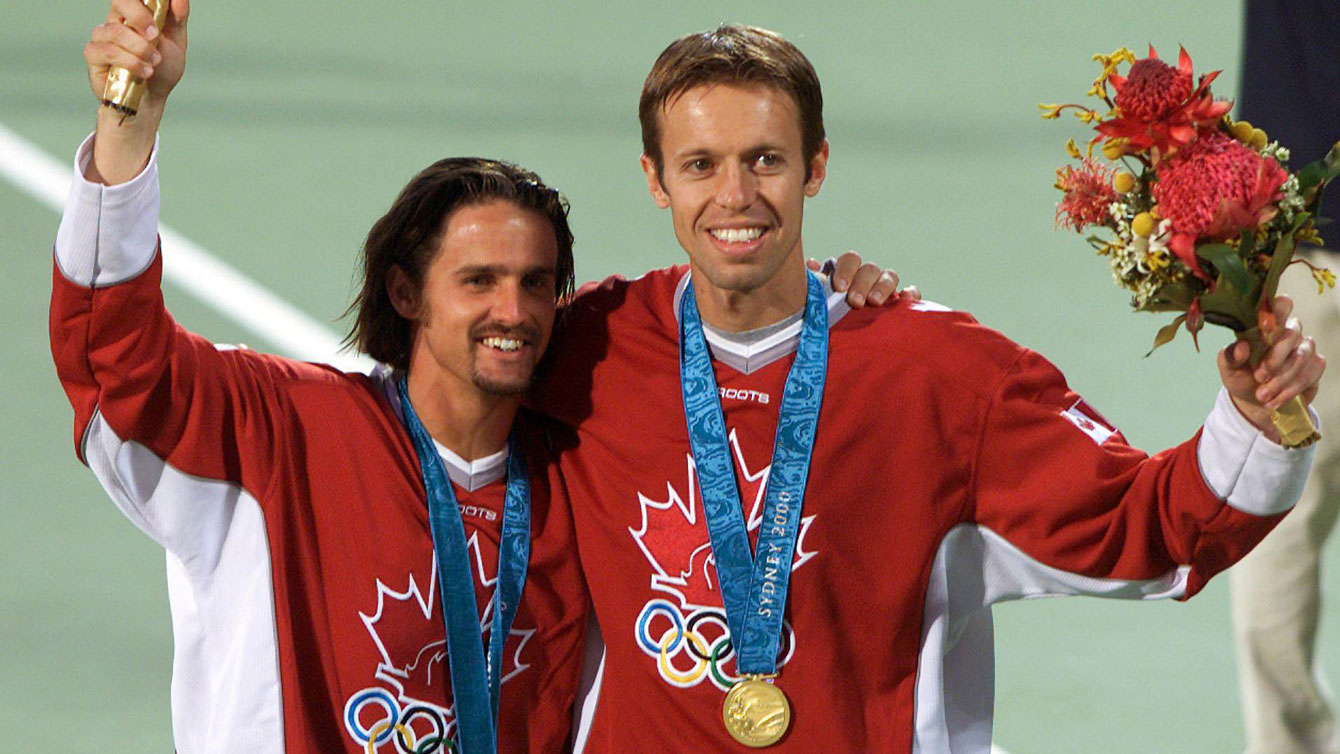
Sébastien Lareau and Daniel Nestor celebrate their men’s doubles tennis Olympic gold at Sydney 2000. (CP PHOTO/Ryan Remiorz)
It was a final match worthy of being dubbed David versus Goliath. The heavy favourites at Sydney 2000 were “The Woodies”, Mark Woodforde and Todd Woodbridge. The Australian duo certainly had an air of invincibility, having won 61 doubles titles together, including 11 Grand Slams and Olympic gold at Atlanta 1996. On the other side of the net were Canadians Daniel Nestor and Sébastien Lareau who had only started playing together a year prior in the hopes of winning Canada’s first Olympic tennis medal. After dropping the first set to the Aussies, Nestor and Lareau took the next three to produce one of the biggest upsets in Olympic tennis history, winning the gold medal.
2000 – Igali Displays Canadian Pride in Winning Historic Wrestling Gold
Daniel Igali’s feet first touched Canadian soil when he represented his native Nigeria at the 1994 Commonwealth Games in Victoria. He then made the life-changing decision to claim refugee status rather than return to his war-torn country. Within a couple of years, his wrestling career continued at Simon Fraser University where he won 116 consecutive matches from 1997 to 1999. After acquiring Canadian citizenship, he won 69kg gold at the 1999 World Championships, becoming Canada’s first ever wrestling world champion and setting him up to be a favourite at Sydney 2000.
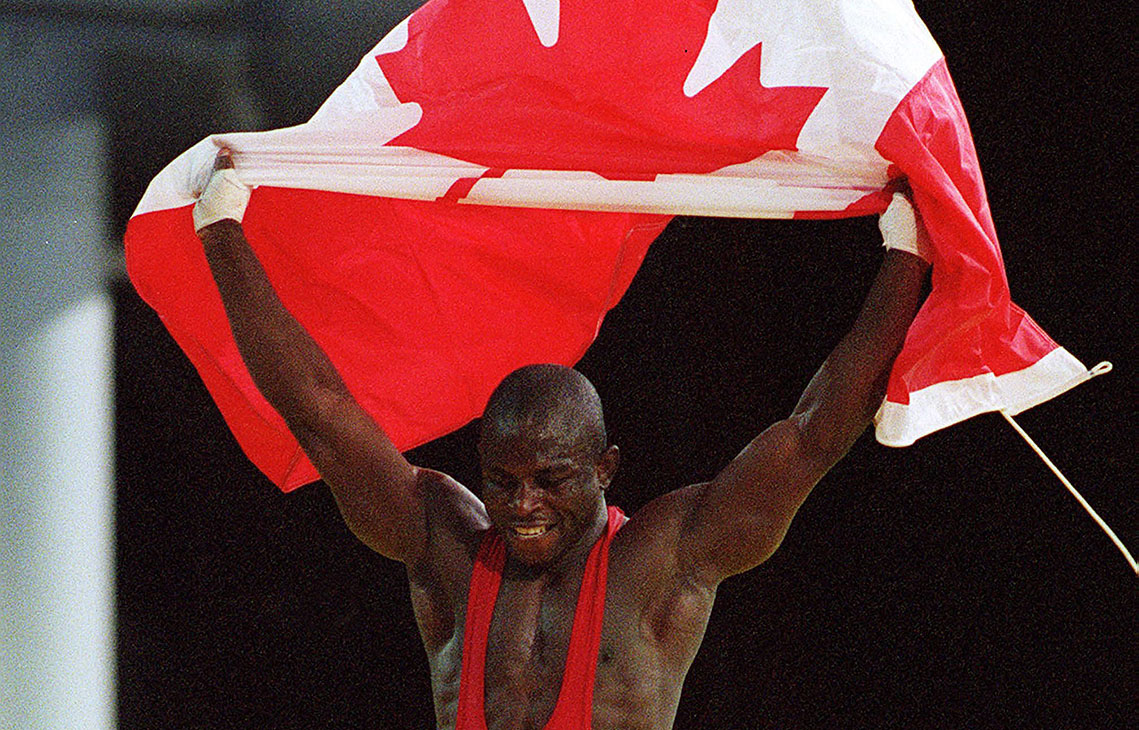
Canada’s Daniel Igali waves the Canadian flag after winning the gold medal in wrestling at the 2000 Sydney Olympic Games. (CP Photo/ COC)
After getting by the world championship runner-up in the semifinal, Igali defeated Russian Arsen Gitinov in the Olympic final. He celebrated Canada’s first ever Olympic wrestling gold medal by draping himself in the maple leaf and then laying the flag on the mat so he could circle around it and kiss it, paying tribute to his new home.
2002 – First Canadian to Successfully Defend Individual Olympic Gold
By the time she made her fourth Olympic appearance at Salt Lake City 2002, Catriona Le May Doan was well accustomed to making history. In November 1997 she had been the first woman to break the 38-second barrier in the 500m. At Nagano 1998, she and Susan Auch became the first Canadian women to share a podium at the Olympic Winter Games when they won gold and silver, respectively, in the 500m. Le May Doan also won bronze in the 1000m. Through the next quadrennial, she became the world’s most dominant sprinter, winning the 500m world title in 1999 and 2001 and lowering the 500m world record five times. At Salt Lake City 2002, Le May Doan did what no Canadian athlete had done before: win back-to-back Olympic gold medals in the same individual event as she broke her own Olympic record. She went on to be that year’s Lou Marsh Award winner as Canada’s Athlete of the Year.
2002 – Gagnon Double Gold in Less Than an Hour
Marc Gagnon had twice just missed the Olympic podium in the 500m, finishing fourth at Lillehammer 1994 and Nagano 1998. Heading into Salt Lake City 2002, he had just one individual Olympic medal – a 1000m bronze – but outside of the Games, Gagnon was incredibly decorated, having won overall world titles in 1993, 1994, 1996 and 1998. But he saved his best Olympic effort for last. With a 1500m bronze already in his pocket in Utah, Gagnon made a last lap pass to win the 500m gold medal, just ahead of teammate Jonathan Guilmette.
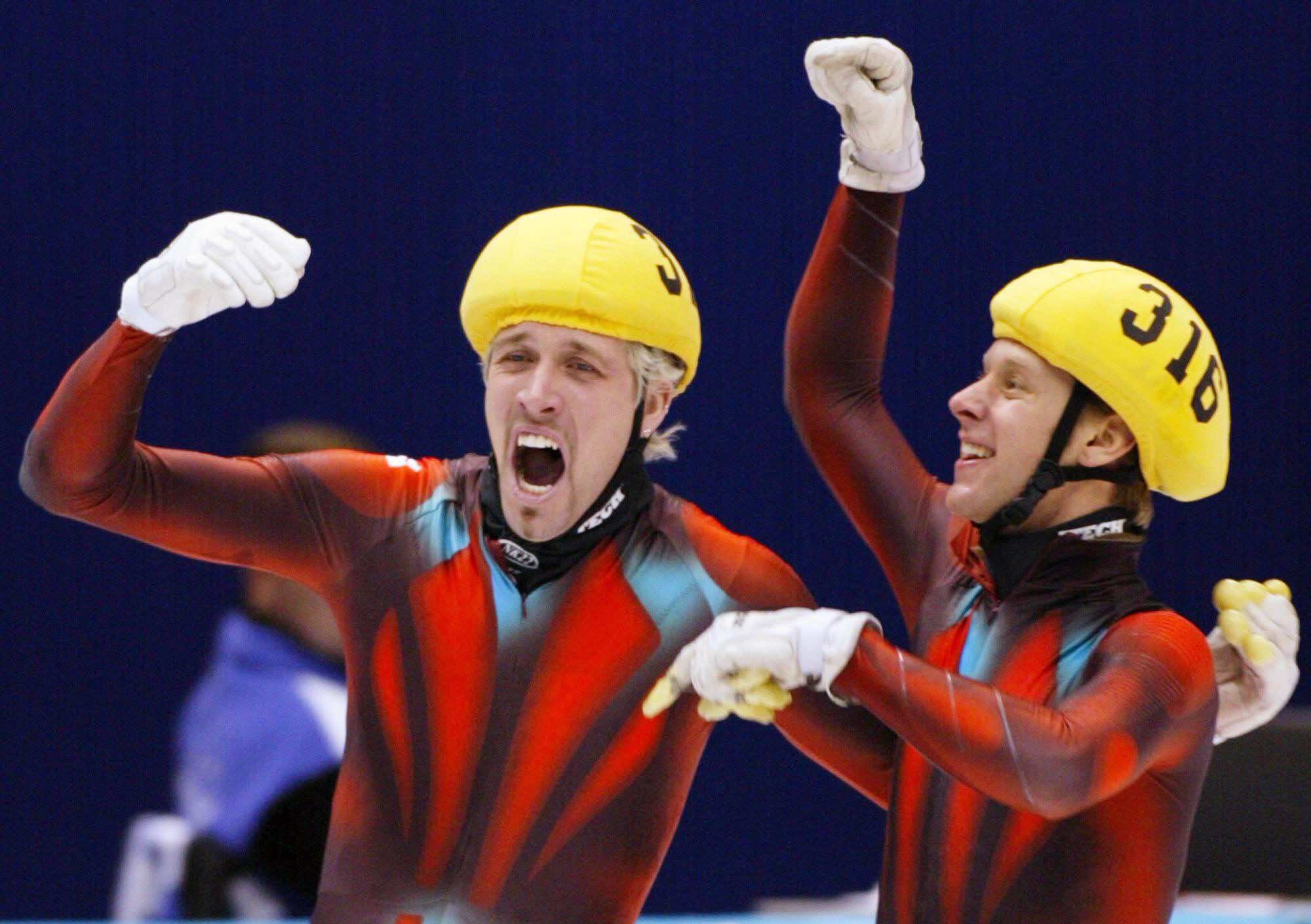
Canada’s Marc Gagnon (left) and Jonathan Guilmette celebrate their gold and silver wins respectively in the 500 metre short track speed skating final, at the XIX Olympic Winter Games in Salt Lake City, Utah, Saturday Feb. 23, 2002. (CP PHOTO/Tom Hanson)
Less than an hour later, the two were on back on the ice winning Canada’s second straight gold in the 5000m relay. With five career medals, Gagnon became Canada’s most decorated Winter Olympian at the time.
2002 – Canadian Pair at Centre of Figure Skating Controversy
Jamie Salé and David Pelletier had won the 2001 World title in just their third season as a pair, setting them up as top contenders for Olympic gold at Salt Lake City 2002. After the short program, their anticipated rivals and two-time world champions Elena Berezhnaya and Anton Sikharulidze were in first with the Canadians in second, meaning whichever team won the free skate would win the gold medal. The Russians went first, making an obvious error when Sikharulidze stepped out of the landing of a double Axel. Salé and Pelletier followed with a clean performance, celebrating with a kiss to the ice by Pelletier. But when the marks were revealed, the Canadians were in second place on a 5-4 judges split, stunning most observers.
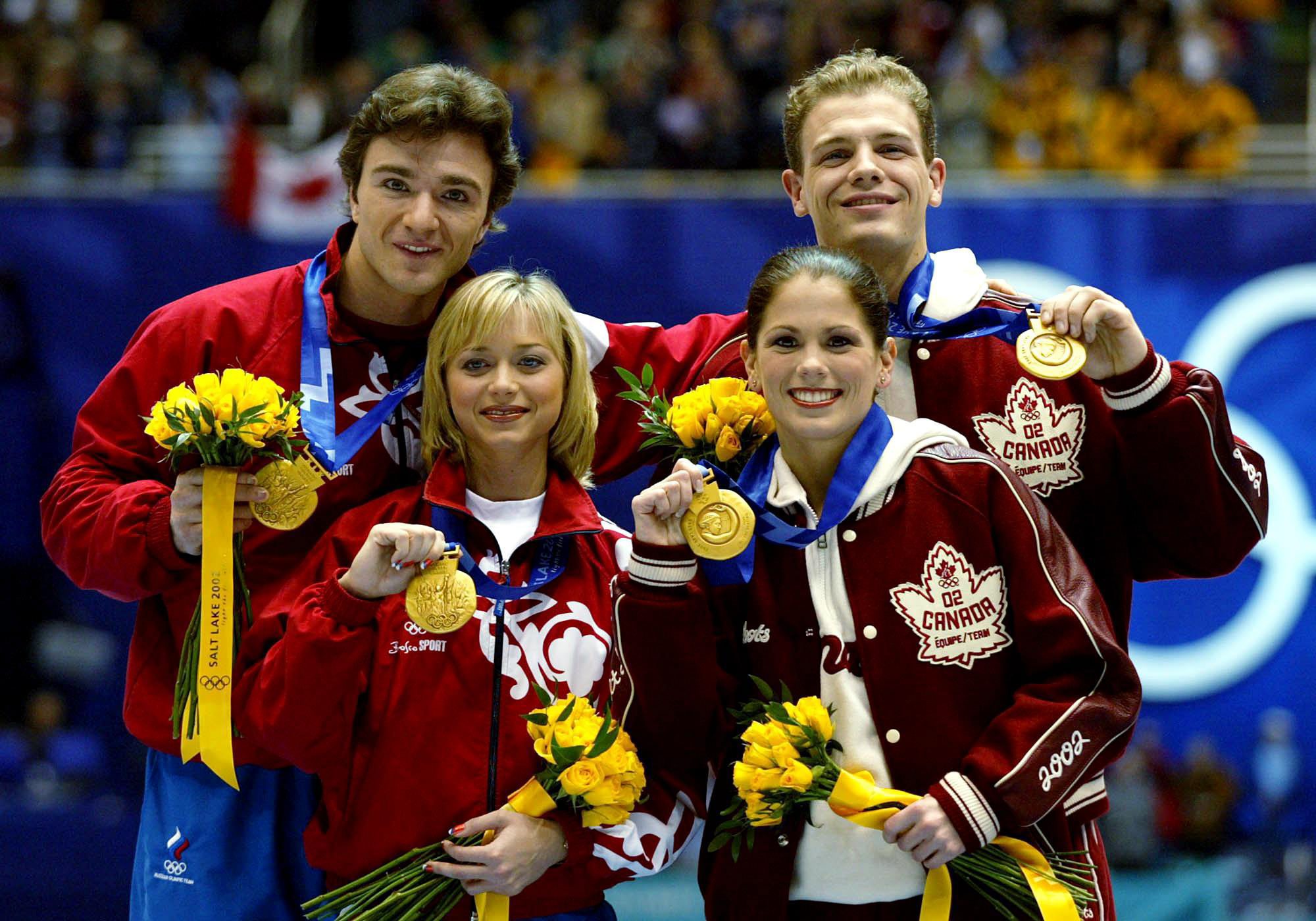
Gold medalists David Pelletier and Jamie Sale stand next to Russians Anton Sikharulidze and Elena Berezhnaya as they show off thier gold medals Sunday Feb. 17, at the 2002 Olympic Winter Games. (CP Photo/HO/COC/Andre Forget)
French judge Marie-Reine Le Gougne then alleged that she had been pressured to favour the Russians as part of an exchange that would benefit the French ice dance team later in the Games. After an assessment, the International Skating Union and International Olympic Committee announced that Salé and Pelletier would be upgraded to co-gold medallists with Berezhnaya and Sikharulidze, who had done nothing wrong, and a second medal ceremony took place. The scandal would lead to a complete overhaul of the figure skating scoring system.
2002-2004 – Beckie Scott Wins All Medal Shades for One Event
Beckie Scott is in the history books as winning Canada’s first ever Olympic medal in cross-country skiing. But she also has the rare distinction of having owned all three medals from the 5km + 5km pursuit at Salt Lake City 2002. It began with a bronze medal, awarded when she crossed the finish line in third place behind Russians Olga Danilova and Larissa Lazutina. But they were both found to have had positive drug tests from December 2001, which would have made them ineligible to compete in Salt Lake City. In June 2003, Lazutina was stripped of her medal and Scott received that silver in October 2003. In February 2004, Danilova was also retroactively disqualified, bumping Scott up to top spot. She received the gold medal that was rightfully hers that June.
2002 – A First and a First in 50 Years Gives Canada Double Hockey Gold
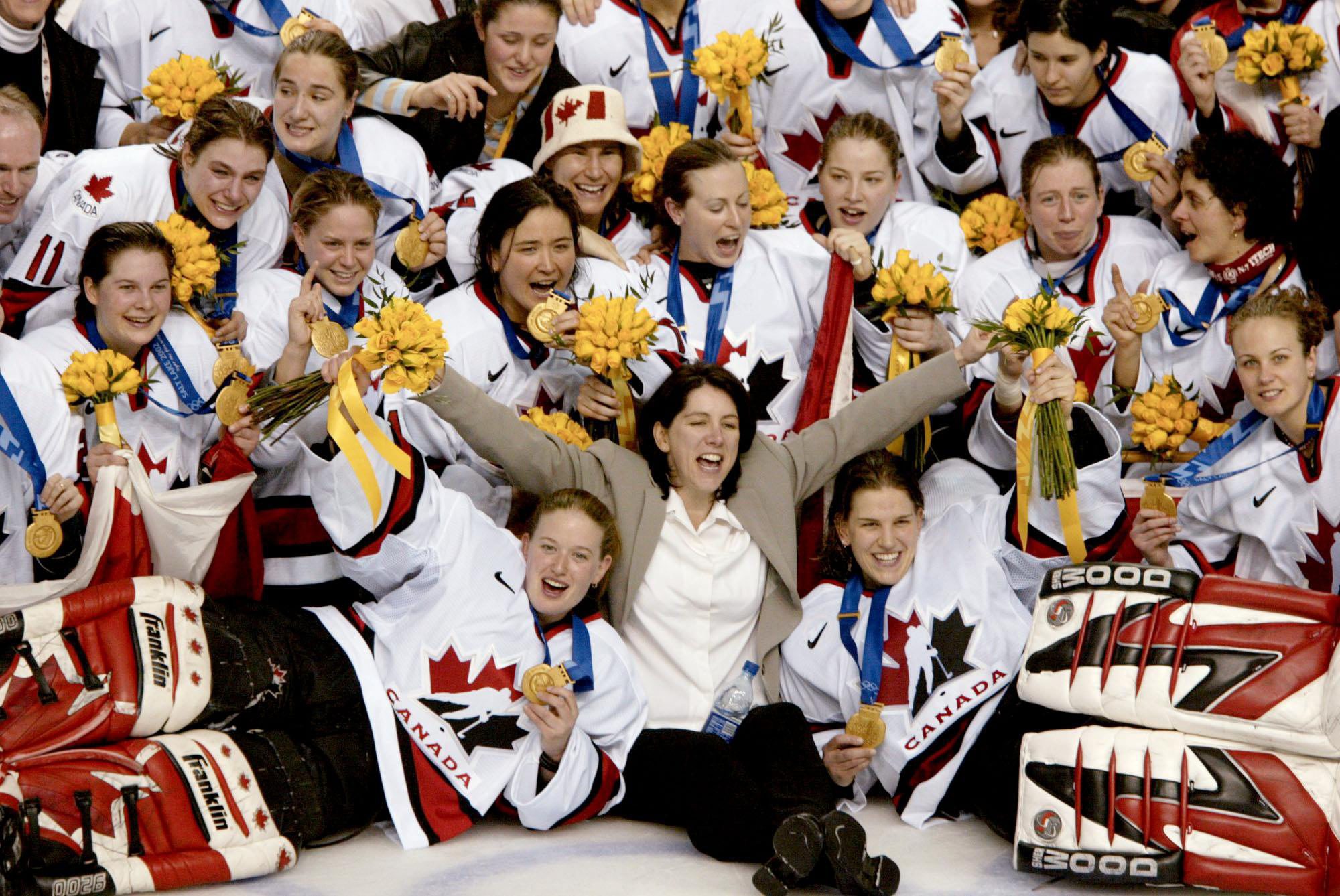
Canadian women’s hockey team coach Daniele Sauvageau (centre) and the Canadian women’s hockey team pose for a team picture with their gold medal after defeating the United States 3 – 2 in Salt Lake City , Utah during the Winter Olympics, Thursday, Feb. 21, 2002. (CP PHOTO/COC/Mike Ridewood)
After taking silver in the first women’s Olympic ice hockey tournament at Nagano 1998, Canada was ready to reclaim its position atop the world at Salt Lake City 2002. Shutting out their round robin opponents by a combined score of 25-0, the Canadians advanced to the final with a 7-3 win over Finland and then won the gold 3-2 over their American rivals. Jayna Hefford netted what would be the game-winning goal with one second to play in the second period. That started a streak of four straight Olympic gold medals for the Canadian women.
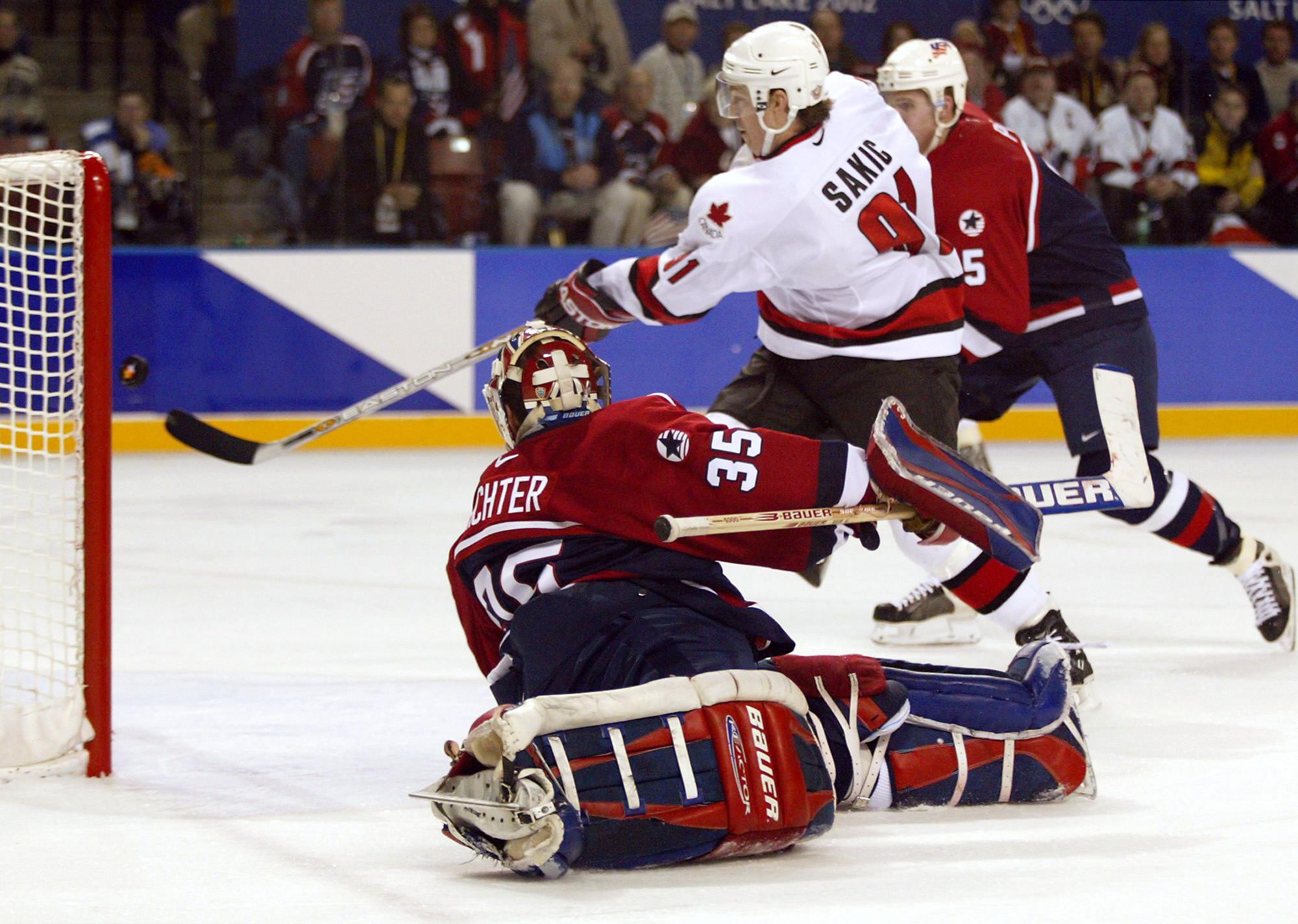
Canada’s Joe Sakic swats at the puck, shot by teammate Jarome Iginla, that scores past USA goaltender Mike Richter in third period men’s hockey action at the Olympic Winter Games in West Valley City, Utah, Sunday, Feb. 24, 2002. Canada beat the USA 5-2 to win the Olympic gold medal. (CP PHOTO/Frank Gunn)
Three days later, the Canadian men also faced the United States in their gold medal game. The team hadn’t had the greatest start to the Games, opening with a 5-2 loss to Sweden and only winning one round robin game. After getting by Finland and Belarus in the quarter and semifinals, Canada fell behind early in the final before coming back. With the game tied at 2 late in the second, Joe Sakic scored the power play goal that would prove to be the winner, ending Canada’s 50-year gold medal drought in men’s Olympic hockey.
2003 – Felicien Flies to World Title
It was a Wednesday night in Paris in late August 2003 when Perdita Felicien made history. She ran the 100m hurdles at the IAAF World Championships in 12.53 seconds to become Canada’s first ever female track and field world champion, setting a national record in the process. It was the standout moment in a career that had its share of Olympic disappointment, but wasn’t without other highlights, including a silver medal at the 2007 World Championships.
2003 – Weir Wins The Masters
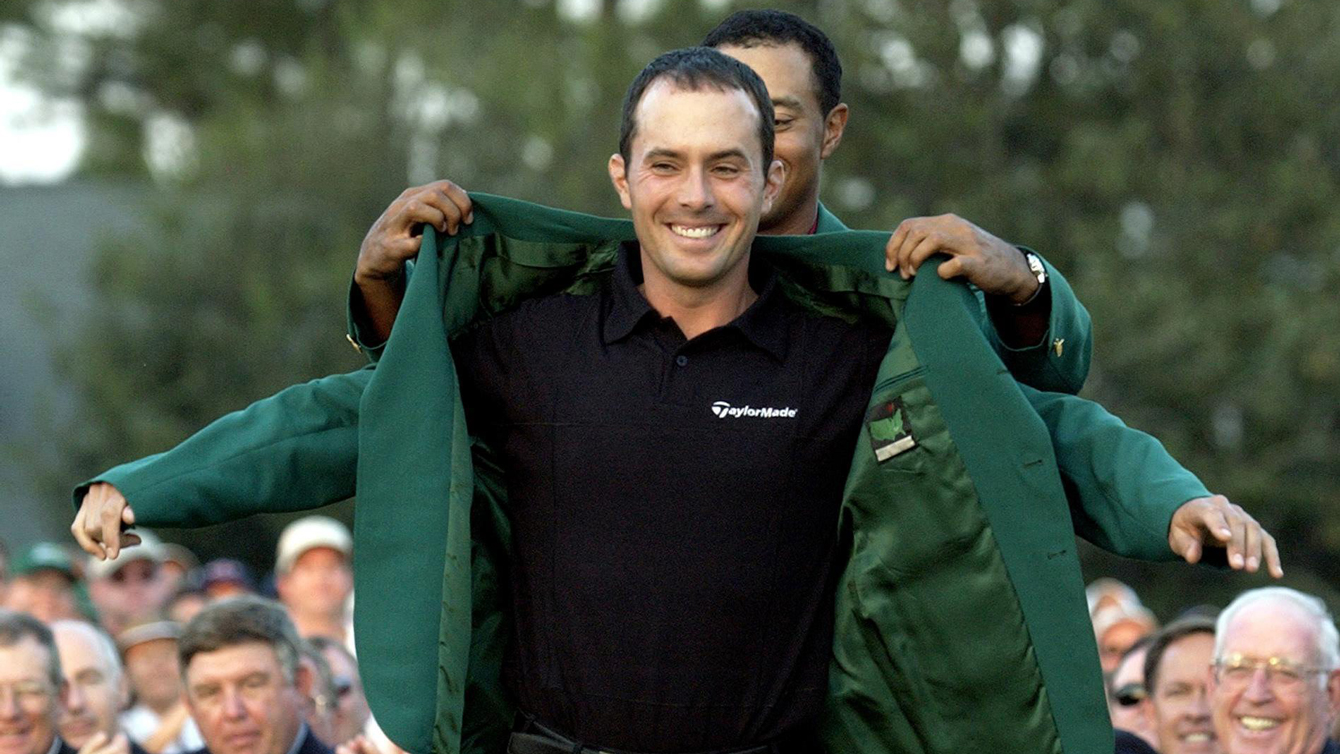
Mike Weir gets the Masters Green Jacket from Tiger Woods after winning the 2003 Masters at the Augusta National Golf Club in Augusta, Ga., Sunday, April 13, 2003 (AP Photo/Amy Sancetta)
The iconic green jacket came north of the border in 2003 when Mike Weir became the first Canadian man to win one of golf’s major championships. It came down to a playoff, as Weir finished the final round tied with American Len Mattiace at 7-under after saving par on 18. Neither man had been on anyone’s radar as title contenders before the start of the tournament. But with five career PGA Tour victories to his credit, including two earlier in 2003, Weir locked down his status as Canada’s greatest male golfer with a short putt on the 10th green.
2004 – Shewfelt Tumbles to Canada’s First Olympic Medal in Artistic Gymnastics
Canadian artistic gymnasts had enjoyed sporadic medal success at the world championships in the 1980s and 1990s, but no one made a mark like Kyle Shewfelt. At the 2003 World Championships, he won bronze medals on floor exercise and vault, becoming the first Canadian gymnast to win multiple medals at the worlds. Favoured to do well in both events at Athens 2004, Shewfelt did not disappoint. After finishing third in qualification for the floor exercise, Shewfelt delivered a near-perfect performance in the final. His score of 9.787 tied him with Romania’s Marian Dragulescu, who had been the top qualifier. But in the complex tiebreaking system, Shewfelt was given the edge and the gold medal. Shewfelt came close to a second podium in the vault, finishing fourth behind Dragulescu after a failed protest by the Canadian team over the Romanian’s score. Three years later, Shewfelt broke both legs in a training session at the 2007 World Championships but in a remarkable recovery made his third Olympic appearance just 11 months later at Beijing 2008.
2004 – Podiums at the Beginning and End of Paddling Careers
Adam van Koeverden was Canada’s only double medallist of Athens 2004. Just 22, he battled Australian Nathan Baggaley to the finish of the K-1 1000m, edging him out for the bronze medal by less than a tenth of a second. But his biggest surprise came in the K-1 500m final the next day. Baggaley was the two-time reigning world champion and took the lead for the first half of the race, but van Koeverden was on his tail and at the midway mark made his move to pass the Aussie and become Canada’s first Olympic champion in canoe/kayak in two decades. He would go on to win K-1 500m silver at Beijing 2008 and K-1 1000m silver at London 2012, making him Canada’s most decorated Olympic paddler.
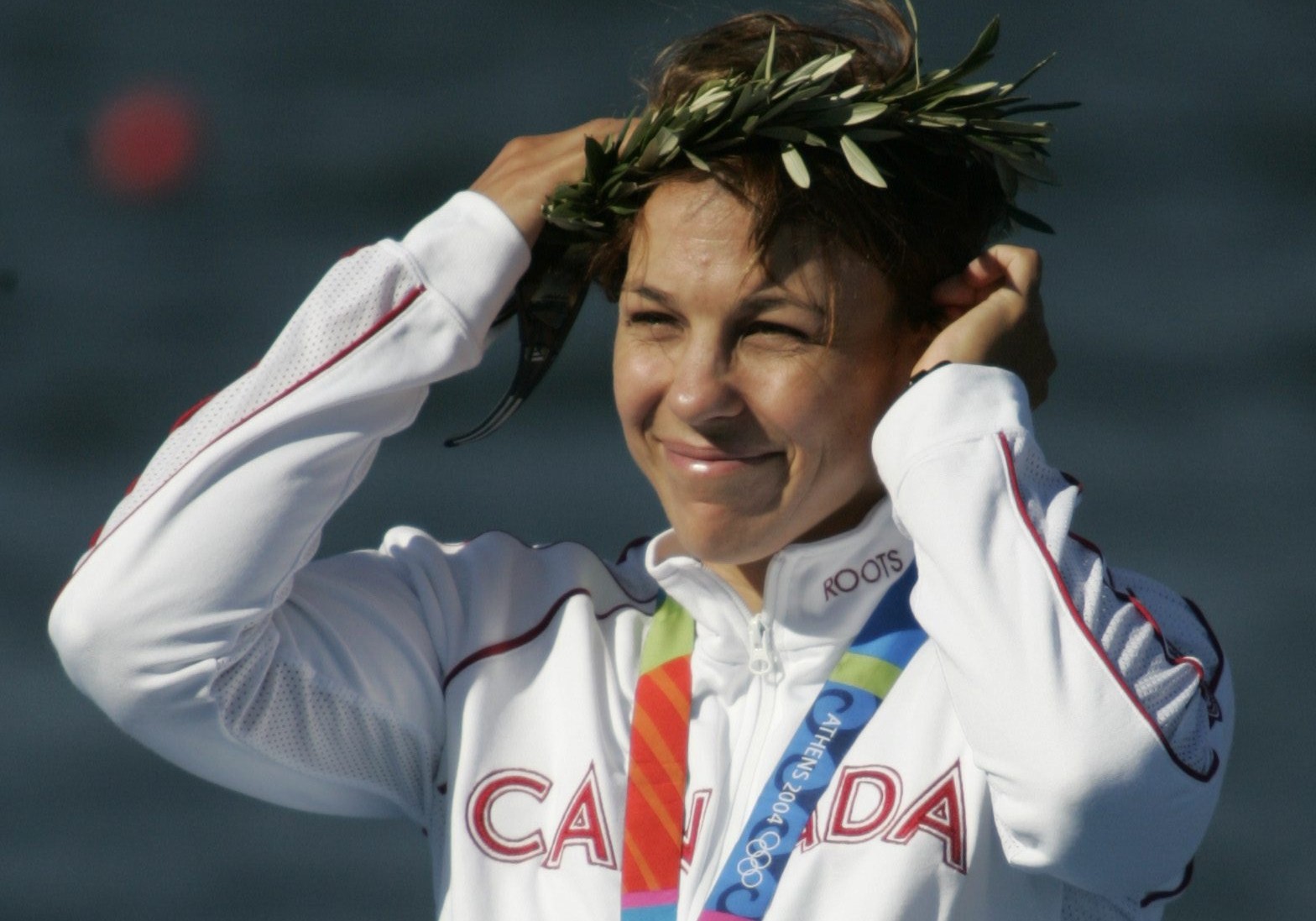
Canada’s Caroline Brunet smiles as she adjusts her laurels after being presented with the bronze medal in the K-1 500m final at the Olympic Games in Schinias, Greece, Saturday, August 28, 2004. (CP PHOTO/Adrian Wyld)
In the women’s K-1 500m, Caroline Brunet won a bronze medal for her third straight Olympic podium finish in the event, having won silver at Atlanta 1996 and Sydney 2000. That brought an end to her illustrious career which included an incredible 21 world championship medals, 10 of them gold.
2004 – Muenzer Claims Canada’s Only Olympic Cycling Gold
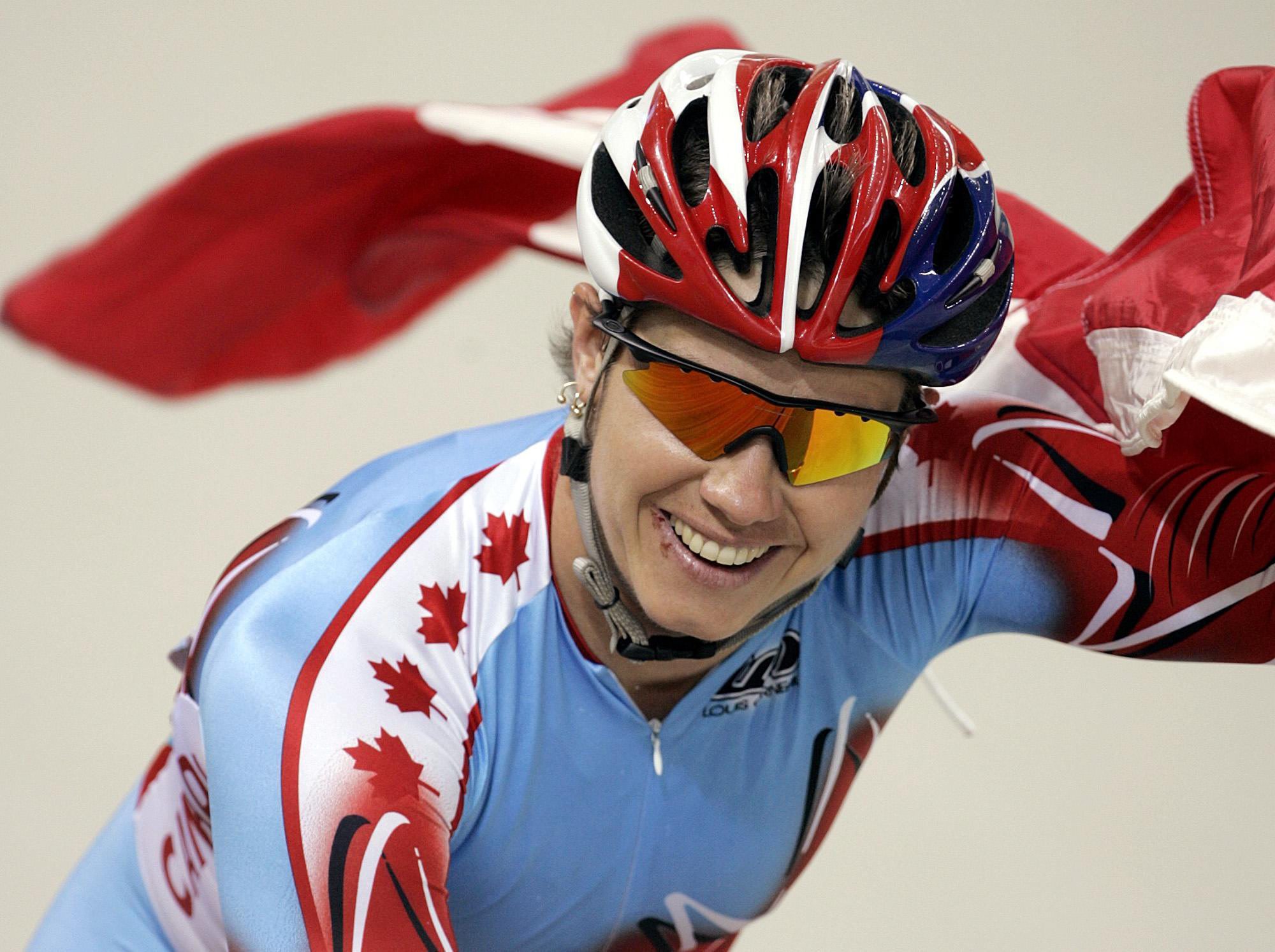
Canada’s Lori-Ann Muenzer of Edmonton celebrates after winning gold in the women’s sprint finals at the 2004 Olympic Games velodrome in Athens Tuesday, Aug. 24, 2004. (AP Photo/Eric Risberg)
Lori-Ann Muenzer became an example of true perseverance at Athens 2004 where she won gold in the sprint to become Canada’s first ever Olympic champion in any cycling event. She was also Canada’s first female Olympic medallist in track cycling. At 38-years-old, Muenzer was almost twice the age of her fellow podium finishers. And she was only able to stand atop that podium thanks to some great sportsmanship, winning on wheels she had borrowed from the French and Australian teams after both of her own tires had blown apart.
2005-2006 – Nash Named NBA MVP Twice
In his second go-around with the Phoenix Suns, Steve Nash became the first Canadian to ever win the NBA’s MVP award at the end of the 2004-05 season, edging out Shaquille O’Neal in the voting. He was just the second non-American to earn the honour and also captured the Lou Marsh Award as Canada’s Athlete of the Year. The 6-3 player made it two straight in 2005-06, joining Magic Johnson as the only point guards in history to win multiple MVP trophies.
2006 – Klassen Leads Canada to Unprecedented Medal Haul
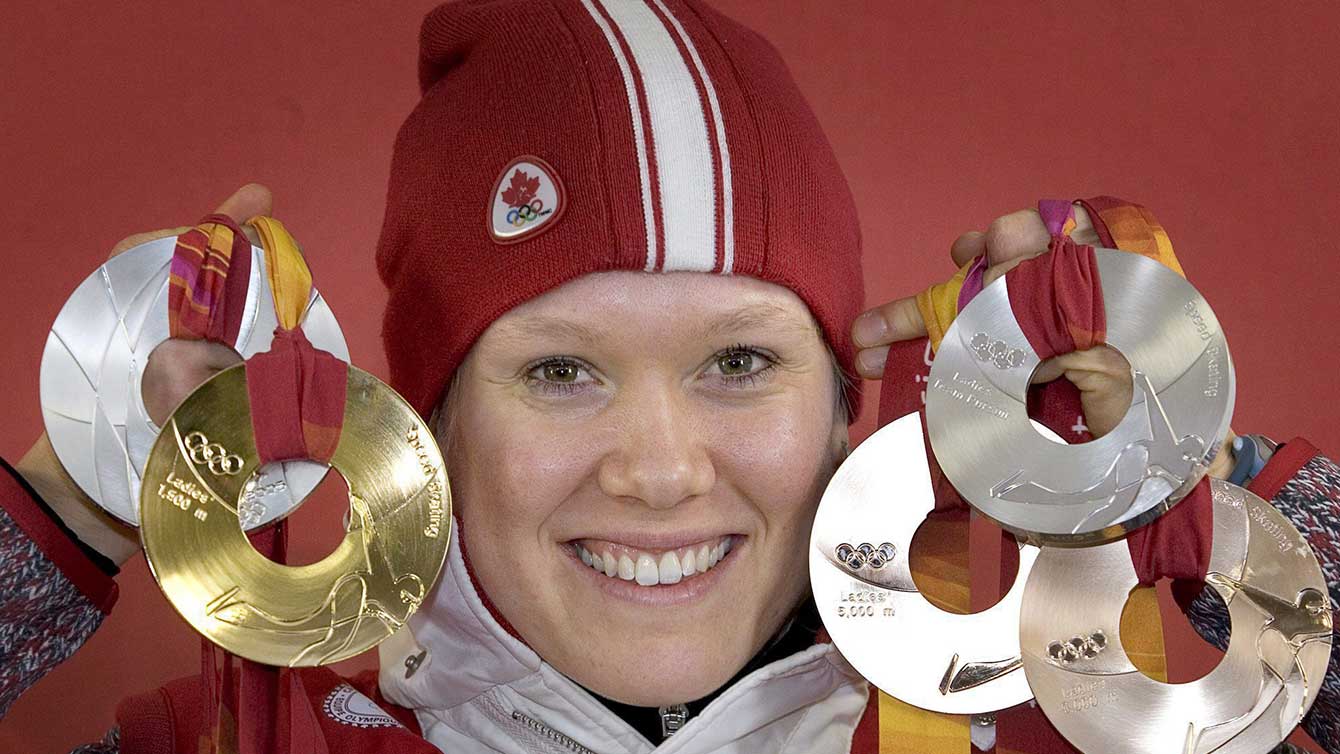
Cindy Klassen holds her five medals won at the Turin 2006 Olympic Winter Games.
Four years after winning her first Olympic medal, Cindy Klassen had an Olympic Games like no Canadian athlete before. At Turin 2006 she reached the podium in every speed skating event in which she was entered, winning gold in the 1500m, silver in the 1000m and team pursuit and bronze in the 3000m and 5000m. The first Canadian athlete to win five medals at a single Games, she was also the first female speed skater to win five medals in one Olympic appearance. Dubbed the “woman of the Games” by then-IOC president Jacques Rogge, her six career medals made her Canada’s most decorated Olympian.
Klassen contributed to Canada’s best-ever Olympic speed skating medal total. She shared the podium with teammates in two events, as Clara Hughes won gold in the 5000m and Kristina Groves took silver in the 1500m. The men’s team pursuit added a silver.
2006 – Age no Obstacle to Olympic Gold
Duff Gibson was 39-years-old when he slid to skeleton gold at Turin 2006, sharing the podium with silver medallist teammate Jeff Pain. That made him the oldest champion of an individual event in Winter Olympic history, a record he held until Sochi 2014. But he wasn’t even the oldest member of the Canadian Olympic Team. That title went to curler Russ Howard, who celebrated his 50th birthday in Turin. Five days later he helped Canada wins its first ever gold medal in men’s curling to make him Canada’s oldest Olympic champion. Opening Ceremony flag bearer Danielle Goyette also put her name into the record books as Canada’s oldest female gold medallist at the Winter Games, playing with the women’s hockey team at 40 years old.
2006 – Norwegian Sportsmanship Spurs Canada to Silver
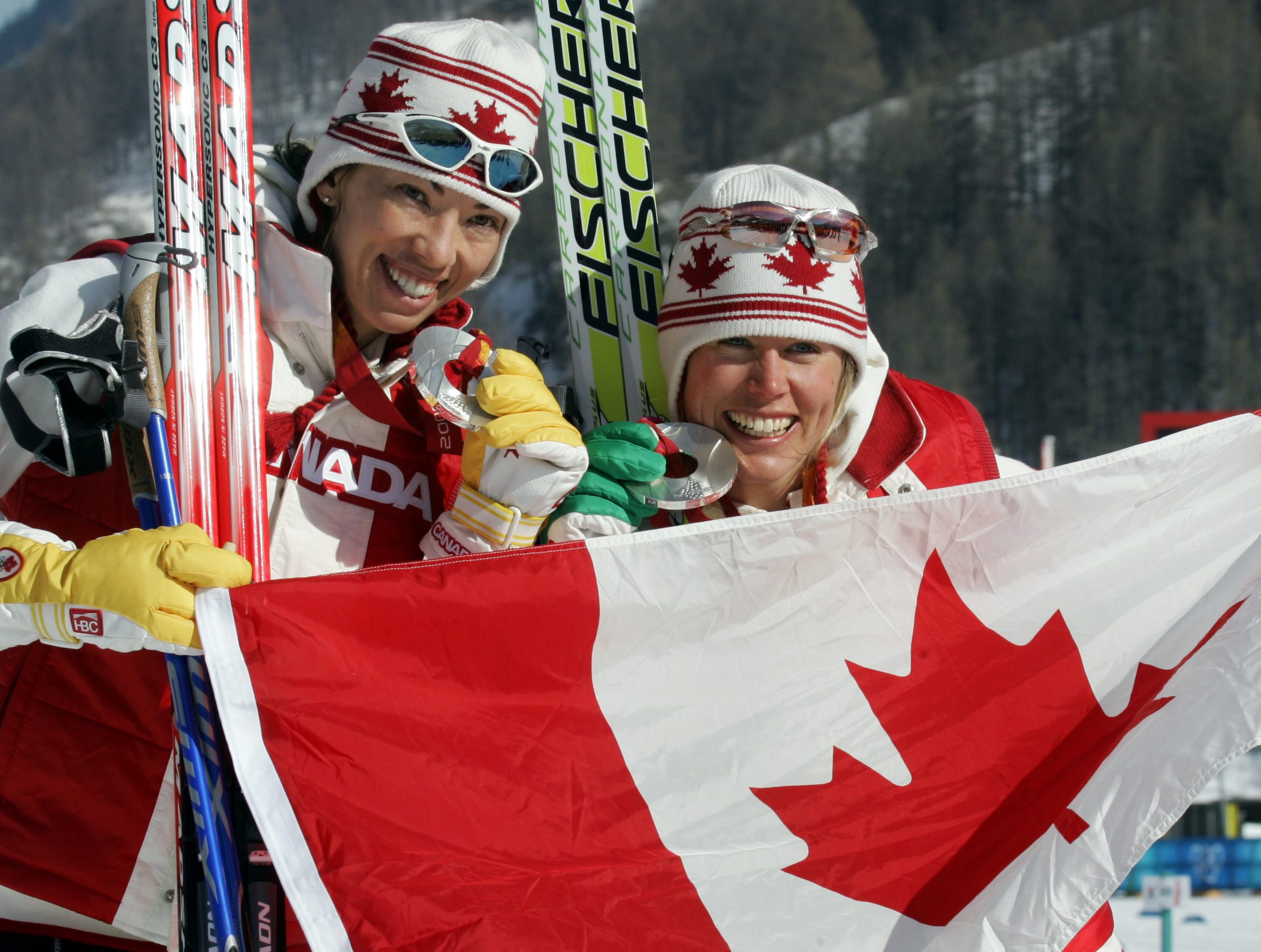
Canada’s Beckie Scott, left, and Sara Renner pose with the Canadian flag as they display their silver medals after the medal ceremony for the Women’s Cross Country Team Sprint at the Turin 2006 Olympic Winter Games in Pragelato Plan, Italy, Tuesday, Feb 14, 2006. Sweden won the gold medal. (AP Photo/Andrew Medichini)
During the Olympic debut of the team sprint at Turin 2006, Sara Renner and Beckie Scott used their incredible cross-country skiing skills as well as an act of kindness to win the silver medal. On the second of her three legs in the final, Renner’s ski pole snapped, but as competitors passed her by, a pole was handed to her from the sidelines by Norwegian coach Bjønar Håkensmoen. That kindness allowed her to continue racing. In gratitude to Håkensmoen, Canadians sent litres upon litres of maple syrup to the coach and the Norwegian Olympic Team.
2008 – Huynh Wins Canada’s First Olympic Gold in Women’s Wrestling
After Canada won no medals in the entire first week of Beijing 2008, the second Saturday of the Games brought an end to the drought. Included in that was Carol Huynh’s gold medal in the 48kg weight class, making her Canada’s first Olympic champion in women’s wrestling. The daughter of refugees from Vietnam had flown under the radar heading into the Games, but took down opponent after opponent until the only one left was Japan’s Chiharu Icho, the two-time and reigning world champion in the weight class. Huynh won the first period 4-0 and then the second 2-1 for the victory, leading to an emotional moment atop the podium.

